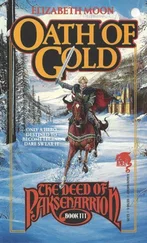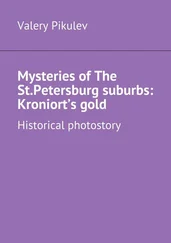The manager of the hotel couldn’t have been sweeter. When he learned of my misadventure, he sent flowers, food, wine, and his own cane—a stout, solid article decorated from foot to curved handle with the little metal-and-enamel insignia that are the badges of local hiking societies. Reading the cane occupied me for a good fifteen minutes and amused me no end. With its aid, I was able to hobble around; and later that evening, when my so-called pals had abandoned me to whoop it up in the nightclubs of Garmisch, Herr Hoffman invited me to join him for a brandy.
He explained with grave courtesy that he thought I might be getting bored with the four walls of my room, and that was certainly true; but the contents of his private sitting room would have been worth a visit even if I had been able-bodied and otherwise occupied. There were several examples of the painted peasant furniture called Bauernmalerei , including a huge Schrank , or cupboard, as fine as any I had seen in the Bayrisches Museum. Each of the double doors had a pair of painted panels—formal bouquets of tulips, roses, and lilies. The creature comforts were nice, too—twenty-year-old brandy; a fire blazing on the open hearth, a fat, purring Siamese kitten to warm my knees and lick my fingers; and a Brahms quartet playing softly in the background.
I had asked Herr Hoffman to pose in front of the hotel the day we left. I had meant to send him a copy, but had never gotten around to it. One doesn’t get around to things, that’s the trouble with the world. But I had had the decency to make a small return for his kindness, stopping in Garmisch and ordering flowers to be sent to his wife, who was in the hospital.
He hadn’t dwelt on the fact, had only mentioned it by way of apology for her absence, but I could tell he was deeply devoted to her and very worried about her condition. They had been married for almost forty years. It was hard to tell how old Hoffman was; his hair and eyebrows were pale pure silver-blond without a touch of gray, and he had one of those faces where the skin looks as if it had been glued to the bones, with no excess left to sag. Not handsome, probably not even in youth, but distinctive and distinguished-looking.
I didn’t have to look for additional evidence. I knew. But I looked anyway. The receipt for the hotel bill wasn’t among the miscellaneous papers I had examined. Since I had been an official representative of the museum and expected to be reimbursed for my expenses, I had filed the bill with my business papers, so I found it without difficulty. The Gasthaus Hexenhut wasn’t one of your modern computerized chains. Hoffman had written the bills himself. I had studied the stained envelope till my eyes ached; the spiky angular handwriting was as familiar as my own.
There had been six of us at the hotel that week—myself and five others. In the past few days, I had heard from two of the five. Tony had gotten a sudden urge to visit me, and Dieter had shown up in my office with a plastic snake. Perhaps the answer to John’s casual question was more complex—and more ego-deflating—than I had realized. Perhaps I was not the only one to have received a photograph of the Trojan gold.
Hoffman had spent more time with me, but he knew the others and their credentials. We had all registered under the names of the institutions we represented. It wasn’t too unusual for Tony to pay me a visit. It wasn’t unlikely that Dieter should drop in. But that made two out of five, and unless I was getting paranoid (which was quite possible) a third member of the group might also be in Munich. I had not known Jan well, and I hadn’t noticed his resemblance to the man in the painting by Van der Weyden, probably because of Jan’s hair, which was so conspicuously gorgeous, it drew the eye away from his other features. (The principle is well known to experts in disguise, I am told.) I had not seen the hair of the man Gerda had pointed out, only his spare, unadorned profile. If it wasn’t Jan Perlmutter, it was Jan’s twin brother.
I was sitting there pondering the meaning of it all and wondering what I was going to do about it when the doorbell rang. The sound split the stillness of the room like a scream; I jumped and Caesar bounded to his feet howling like the hound of the Baskervilles as he plunged toward the front door. A crash from the hall marked his progress; it also marked the demise of my favorite Chinese vase.
I kept the chain in place when I opened the door. It had stopped snowing and the wind was rising. Schmidt’s mustache flapped wildly in the breeze.
“ Abend ,” he said brightly.
“What are you doing here at this hour?”
“It is only ten o’clock. You have not gone to bed.”
“I was just about to.”
Schmidt stamped his feet and hugged himself, pantomiming incipient freezing to death. “Let me in.”
“By the hair of your chinny chin chin,” I muttered. “Oh, hell. Come in.”
Schmidt led the way to the living room, shedding his hat, coat, scarf, and gloves as he went. I picked up the coat, hat, scarf, and one of the gloves, and pried the other one out of Caesar’s mouth.
Already comfortably settled on the couch, Schmidt awaited my attentions. “Coffee?” he said in contemptuous disbelief, indicating the pot.
“What did you expect, Napoleon brandy?”
“Yes, thank you,” said Schmidt.
“No brandy, Schmidt.”
“Beer, then.”
“No beer. You are not spending the night and I am not going to drive you home and you are not leaving my house in a state of vulgar inebriation.”
Schmidt sighed. “Coffee.”
“Coffee,” I agreed.
When I came back from the kitchen with a fresh pot and an extra cup, Schmidt was looking at the snapshots. His mustache was twitching with pleasure. Schmidt loves looking at snapshots. He also loves having his picture taken. If he is anywhere in the vicinity when a photographer is at work, the finished product will have Schmidt or part of him somewhere in the background.
“You have not shown me these,” he said indignantly.
“I had forgotten about them.” I sat down on the couch beside him. “I took them at the ISSAMA meetings last winter.”
“I had deduced as much,” said Schmidt, contemplating a photo of Tony, who was pointing, in the idiotic way people do, at the Zugspitze. “It is not good of Tony. He looks drunk.”
“It was cold. That’s why his nose is so red.”
“Ha,” said Schmidt skeptically. “Oho, here is Elise. I have not seen her for two years. She should not make her hair that strange shade of pink.”
So it went, with Schmidt making catty remarks about his friends. Schmidt knows everybody and he adores conferences; he had been sick in bed with flu that year, or he would have insisted on going along. I expected his encyclopedic memory would falter when it came to Jan, but I was in error.
“Perlmutter,” he announced. “Bode Museum, East Berlin.”
“Very good, Schmidt.”
“I have an excellent memory for faces,” Schmidt said, twirling his mustache complacently. “I have met this Perlmutter only once, but never do I forget a face. It was in Dresden; he studied then under Kammer. Young, he is, but brilliant, it is said. Hmmm. Now who…”
Frowning slightly, he studied the last of the snapshots. I said casually, “Oh, that’s just the hotel where I stayed.”
“But who is this fellow? Wait, no, don’t tell me; I will remember in a moment. I never forget a face.”
“You’ve never seen this face. It’s the owner of the hotel.”
“He looks familiar,” said Schmidt.
“He does not. Come on, Schmidt, you’ve already scored, don’t overdo it.”
“I have seen him. I know I have seen that face somewhere. But I do not remember the hotel. In Garmisch, you say?”
Читать дальше








